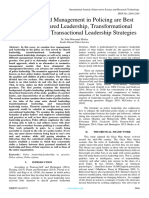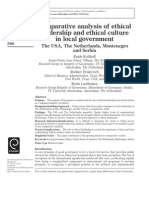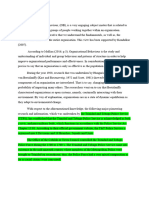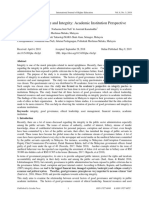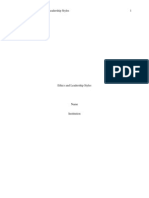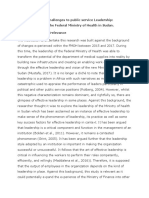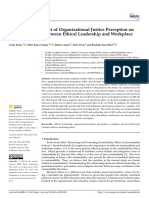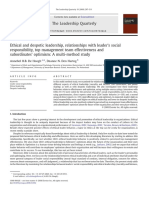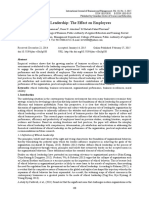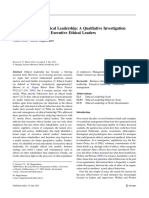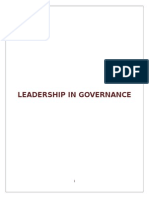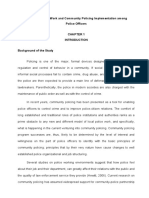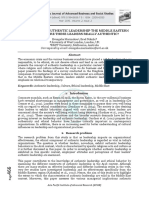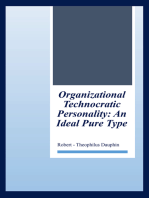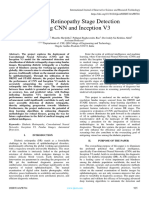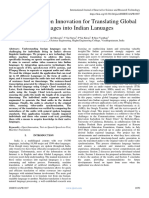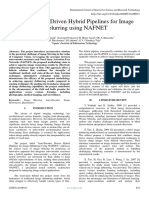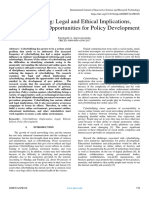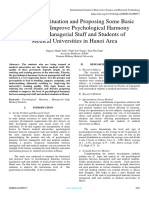Professional Documents
Culture Documents
The South African Police Service Is Currently Experiencing Ethical and Principled Leadership Crisis On A Strategic Level
Original Title
Copyright
Available Formats
Share this document
Did you find this document useful?
Is this content inappropriate?
Report this DocumentCopyright:
Available Formats
The South African Police Service Is Currently Experiencing Ethical and Principled Leadership Crisis On A Strategic Level
Copyright:
Available Formats
Volume 8, Issue 4, April – 2023 International Journal of Innovative Science and Research Technology
ISSN No:-2456-2165
The South African Police Service is Currently
Experiencing Ethical and Principled Leadership Crisis
on a Strategic Level
1 2
Dr. John Motsamai Modise Phemelo Sheldon Modise
South African Police Service North-West University, Potchefstroom
Abstract:- This research responds to a call for further the causes and effects of ethical leadership is highly
research on leadership in the South African Police significant as a result of the increase in executive leader
Service. Effective police leaders become adept at scandals in the police (Brown & Trevino 2006). Leaders
responding to challenge. Ethical leadership is a who respect ethics can affect how their team behaves by
necessary ingredient for successful crisis management. applauding moral behavior and chastising immoral behavior
Police leaders are responsible for preserving democratic, based on the consequences they have on others (Brown &
economic and professional values in their capacity as Trevino, 2006).
leaders, in both the short and longer term. They should
be able to master and deal with daily operations, Organizational psychology leadership concepts like
emergency events and various types of crises, transformational leadership and operant leadership provide
incremental developments and reforms, both separately direction on how to effectively promote ethical behavior. It
and simultaneously. This comprises a large range of has been demonstrated that ideas such leader transparency,
situations and management tasks. Against this fairness, punctuality, consistency, and proportionality of
background, we will argue that leadership both within answers to performance are effective, whereas unjust
and by the police has become more complex and treatment can have a detrimental impact on job performance
challenging in recent years. At the same time, we believe and rule adherence. The lack of supervisory presence, the
that police leadership is a crucial resource in order to failure of higher officers to establish uniform standards, and
ensure the efficient operation and development of the supervisors' willing blindness to corrupt behavior are among
police service, and essential if the police are to function the shortcomings that have been identified. Recent
efficiently with the level of quality and ethical standards advancements in police demonstrate a number of measures
that meet the demands and expectations of a liberal that can foster leadership responsibility across the
democracy. Drawing a direct line between these two organization, such as transparent accountability frameworks,
may be oversimplified, but there is unquestionably a values declarations, management intervention models, and
connection between the leadership issues that have decentralization of complaint handling. Combining these
plagued the SAPS for many years and the agency's efforts and including the leadership traits stated above can
declining effectiveness in preventing, investigating, and provide a complementary framework for enhancing
prosecuting crimes and lawlessness. It goes without management, leadership, and ultimately integrity.
saying that an ineffective police force has a detrimental
impact on people's freedom and security, on investment Framework for Conceptualizing Ethical Leadership
and economic progress, and on the stability of the entire The first study on the concept of ethical leadership was
nation. Unfortunately, there is little evidence that the done by Trevino et al. (2000). Their definition is founded on
issue is receiving the attention that it merits from the a comparison of social scientific and philosophical
nation's political leaders. perspectives on ethical leadership. Philosophers defined
ethical leadership from a normative viewpoint based on
Keywords: Ethical Leadership, Leaders’ Ethicality, what ethical leaders are expected to do. Ciulla (2004)
Strategic Leadership, Strategic Management, Relationship emphasizes the importance of upholding and respecting the
Management, Leadership Continuum. rights and humanity of others when discussing how to lead
ethically. On the other hand, social science literature that
I. INTRODUCTION combines leadership and ethics has been used to research
ethical leadership. Therefore, studies have linked perceived
Leadership is the root of all organizational issues and personal qualities of leaders, such as honesty, integrity, and
its social position is institutionalized and recognized trustworthiness, to their efficacy (Brown and Trevino,
(Crevani et al., 2010; Tourish, 2013). Police professionalism 2006).
and sustaining police integrity are two things that are
frequently cited as being most dependent on police Effective leadership has also been combined with
leadership. Law enforcement officers must be moral role cognitive-based trust, which refers to demonstrating
models. Whether there is accountable leadership or not, it reciprocal care and worry as well as dependability and
will ultimately have a big impact on society. Research into dependability. To critically examine the idea of ethical
IJISRT23APR1247 www.ijisrt.com 1542
Volume 8, Issue 4, April – 2023 International Journal of Innovative Science and Research Technology
ISSN No:-2456-2165
leadership, Trevino et al. (2003) conducted an exploratory Leadership Failings
study. As a result, ethical leadership has been closely linked South Africa's high turnover of national police
to personality traits like honesty, ethics, reliability, and commissioners is a symptom of the country's fractured
fairness. This aspect is known as "moral person," and it police service says security analyst Ziyanda Stuurman.
represents "the leaders' personal traits, character, and Since the advent of democracy, a number of prominent
altruistic motivation" (Brown and Trevino, 2006: 597). The police officers have failed to complete a term in office,
second component of moral leadership is referred to as including National Police Commissioner. "I believe it
"moral management," and it describes the steps leaders take speaks to the high level of politicization of that position, and
to influence their followers' ethical and immoral behavior. what that has meant is that there is not this incredibly high
The second viewpoint on moral leadership has many rate of turnover," the author says. The issue at the top of the
different facets. In order to construct ethical leadership on a SAPS can be illustrated by looking at the number of senior
multi-dimensional basis, researchers (De Hoogh and Den officers that are being investigated for, or implicated of,
Hartog, 2008, 2009; Kalshoven et al., 2010) built on the serious crimes and irregularities, or who have actually been
behavioral dimensions originally defined by Brown et al. found guilty for these crimes. Questions about police
(2005). This suggests that the construction of ethical leadership have also been raised by scandals involving
leadership is founded on various behavioral dimensions. prominent police commissioners listed below:
However, it is important to note that Brown et al.' construct
served as the basis for the multidimensional concept's Commissioner, Jackie Selebi: He was appointed
development. Ethical leaders are frequently viewed as fair national police commissioner in February 2000 to
and trustworthy, ethical leadership is anticipated to manifest 2008. In 2010 he was sentenced to 15 years in jail for
through socioemotional foundation (Brown and Trevino, taking bribes from drug dealer Glenn Agliotti.
2006). To put it another way, since moral leaders are known Commissioner, Bheki Cele: Bheki Cele, who was
to treat people fairly and to be driven by altruism, followers chosen to succeed Commissioner Selebi from 2009 to
should return the favor in a manner that benefits their 2011, served for only two years before being suspended
leaders and organizations (Mayer et al. 2009). for claims of improper spending and poor management
in connection with the leasing of a building. He was
Police Leadership in the South African Police Service finally fired in 2013, but he later returned as the minister
Leadership behaviors are prioritized in police of police in 2018.
leadership. It is recommended that leaders demonstrate traits Commissioner, Riah Phiyega: She was appointed in
including dependability (Murphy and Drodge, 2004), 2012 and was suspended by then president, Jacob
honesty and integrity (Vito and Vito, 2015), decision- Zuma in October 2015, following the findings of the
making (Andreescu and Vito, 2010), and innovation commission of inquiry into the Marikana tragedy.
(Schafer, 2013). Desirable leadership behaviors turn into Commissioner Cele’s successor, the Farlam
abstract, impossibly high "wish lists" that represent what Commission of Enquiry into the Marikana Massacre
"ought to be" (Rost, 1993). The "reality" of leadership for recommended that Commissioner Riah Phiyega's fitness
police commanders is ignored, as are the definitions and for office be investigated despite the fact that she had
understandings of leadership Grint (2005a:34) draws a never been accused of corruption. Instead, the group of
conclusion: "ministerial reference" found that she had lied and
cheated in relation to performance and disciplinary
“The most intriguing thing about making lists is that, issues.
by the time the list is finished, the only reasonable Commissioner, Khomotso Phahlane: The former
explanation for the possessor of such a talent base is "God." acting National Commissioner was fired in July 2020
after he was found guilty of elements of dishonesty.
Effectiveness and "what works" in police leadership Khomotso Phahlane was chosen to serve as Acting
are major policy concerns. Effective leadership behaviors National Commissioner after she was suspended in 2015.
are crucial in the formal discourse of police leadership, However, Mr. Phahlane was expelled from the SAPS in
according to the College of Policing Leadership Review 2020 after being accused of fraud and corruption in
(2015a:6). We must first define desirable qualities in an 2018. His trial just got underway and is still pending.
ideal police leader in order to develop a police leadership Commissioner, Khehla John Sitole: was chosen in 2017,
that is appropriate for its purpose in a profession that is not long before the Ramaphosa and Zuma factions of the
evidence-based, ethical, and serving a diverse, democratic ANC engaged in a fierce power struggle at the ANC's
community. This makes police leadership effective across five-early National Conference. The High Court
the board. Leadership becomes into a "commodity that, once determined that Mr. Sitole had violated his obligations
identified, can be bottled and distributed to hungry when he purchased an intelligence "grabber" at a much
organizations," according to Murphy and Drodge (2004:1). inflated price, which grabber was then used to monitor
This method falls short in capturing the complexity of conversations during the ANC conference. As a result,
leadership, including why and for whom certain leadership Mr. Sitole is now very likely to be fired. Khehla Sitole,
behaviors are "effective" or "ineffective" and when they are. the police commissioner, resigns by mutual consent and
The method ignores the "myriad of contexts within which "in the best interests of the country." On March 31,
police leaders must operate," (Wright et al. 2008:66). 2022, National Commissioner Khehla John Sitole
IJISRT23APR1247 www.ijisrt.com 1543
Volume 8, Issue 4, April – 2023 International Journal of Innovative Science and Research Technology
ISSN No:-2456-2165
resigned from his job 'by mutual accord' with President SA Revenue Service, to name a few. Even the most capable
Cyril Ramaphosa. and perfect SAPS Commissioner would have had to do their
It doesn't get any better at the levels just beneath duties while keeping an eye out for political ploys that may,
National Commissioner. When they appeared in court at any point, have ended their term. Not exactly the makings
toward the end of the previous year, the Deputy National of a cool, collected leader.
Commissioner, Bonang Mgwenya, and 14 more officers
were accused of fraud, theft, corruption, and money II. UNDERSTANDING POLICE LEADERSHIP
laundering. Along with the Gauteng Provincial
Commissioner and Deputy Commissioner, she is Position and rank in the police are only loosely
charged. (This is the same case that Mr. Phahlane, the correlated with the activity and resource of leadership. At all
former National Acting Commissioner, is appearing in. levels of police organizations, it is a resource that is required
Arno Lamoer, the then provincial commissioner for (Fleming, 2015). Leadership is used on the front lines as
the Western Cape, was sentenced to six years in well as at the strategic, medium, and senior levels. Every
prison in May 2018 for corruption, along with two police officer evaluates situations, makes judgments,
other soldiers. Mmamonnye Ngobeni, a former communicates, and in doing so, demonstrates leadership in
KwaZulu-Natal Provincial Commissioner, was the course of their daily work. If the police organization is to
charged in court in October 2020 with corruption and be seen by both internal and external people as respectable,
thwarting the course of justice in relation to lodging effective leadership is crucial. In an environment that is
tenders from the 2010 FIFA World Cup. becoming more dynamic and complicated, effective
Commissioner, Richard Mdluli, who served as chief of leadership is a requirement for police organizations as well
criminal intelligence from 2009 to 2012, is another case (Fleming, 2015).
involving top police management that has to be brought
up. It is commonly acknowledged that Mr. Mdluli took In his 1955 paper "Skills of an Effective
advantage of his position to promote the then-president Administrator" for the Harvard Business Review, Robert L.
Zuma and hire several of his own relatives informally. Katz found that administrators needed three key
But Mr. Mdluli's five years in prison were due to the fact competencies: technical, interpersonal, and conceptual. This
that he had abducted and abused his former lover's is referred to as the "Three-Skill Approach" by Northouse
husband. (2013). According to Haberfeld (2013), who cites Swanson
General Fannie Masemola is the new national police et al. (1998), there are three different sets of competencies
commissioner. or talents that can be used to understand police leadership.
Similar managerial abilities to those mentioned by Katz in
Lack of stability his 1955 article are described by Swanson et al. This
From Generals Fivaz to Sitole inclusive, there have strategy for police leadership, in our opinion, is quite
been nine National Commissioners since 1995, four of beneficial.
whom have served in an acting capacity. This shows that the
median tenure of each of them in the job was three years. The Police Leadership Qualifications Framework
Because Mr. Fivaz and Mr. Selebi each held office for 14 (PLQF), introduced by the National Police Improvement
years, the most recent seven Commissioners actually served Agency (NPIA) in England and Wales, has formulated the
an average of only 20 months each. following definition of police leadership: "the ability to
effectively influence and combine individuals and resources
This extraordinarily swift turnover hasn't promoted to achieve objectives that otherwise would be impossible"
leadership stability. Within the vast SAPS organization, no (Johannessen & Glomseth, 2015: 7). Glomseth writes this in
one has been able to establish their authority or management the Norwegian book on police leadership. According to
style, and no one has been able to cultivate and educate a Gibson and Villiers, "leading by example, leading others,
corps of second-tier leaders from which their successor leading teams, leading units, and leading organizations" are
could be chosen. Naturally, since they were unsure of their the five integrated levels that make up leadership (Gibson &
future status, acting commissioners were unable to settle Villiers, 2006: 7).
into their roles or make long-term preparations. In the
meantime, some of them have also acted hurriedly, The foundation of this strategy is the identification of
modifying systems and installing top officials without the knowledge and abilities required to fulfill and maintain
according to protocols, giving the impression that they effective leadership roles. This methodology can be used to
wished to make major institutional changes before their educate and train police leaders so they can provide the
acting tenure was over in addition to the fact that this has no police force with competent leadership both individually and
stabilizing effect. collectively. "(Police) leaders are expected to generate a
sense of purpose that both motivates and directs followers so
Analyzing this lack of stability requires taking into that they voluntarily make a meaningful contribution to the
account how unstable the rest of the state apparatus was organization," write Andreescu and Vito (2010).
during the state capture years. Numerous senior employees
were disregarded or forced to resign from their positions due Police leadership is described by Haberfeld (2006) as
to political influence in institutions like the National "the ability to make a split-second decision and take control
Prosecuting Authority, the State Security Agency, and the of a potentially explosive situation that develops on the
IJISRT23APR1247 www.ijisrt.com 1544
Volume 8, Issue 4, April – 2023 International Journal of Innovative Science and Research Technology
ISSN No:-2456-2165
street." She also asserts that "police leadership is the ability According to the definition, ethical leadership is one of the
of each police officer, beginning from the first day on the constructive leadership philosophies that places a strong
job, to take charge of a situation on the street. This term emphasis on the actions of the leader and distinguishes
encompasses any circumstance that necessitates the between these and real behavior. Ciulla asserts that a moral
assertion of control. The level and scope of control shift as leader is a successful leader.
police officers advance in their careers. Police leadership is
about the capacity to assume control since police work is The art of ethical leadership involves motivating others
founded on the mandate to use coercive action to gain and making wise choices in accordance with a
compliance. The ideals of doing things correctly and doing predetermined set of principles, such as justice,
the right thing will frequently collide in police leadership. accountability, trust, honesty, equality, and respect. These
Three different styles of police leadership are identified by principles actually serve as the cornerstone of responsible
Golding and Savage (2008): leadership. Ethics-based leadership is guidance that has an
impact on followers. In order to enhance ideals, dignity,
Command (ordering, instructing, and directing fairness, integrity, charisma, and innovation without
leadership). jeopardizing how we should act, leaders make decisions that
Leadership (leadership, interactional leadership). reflect their own moral development. The primary objective
Management (management / administration). of any organization's leader is to persuade the membership
to pursue objectives and ultimately realize the organization's
These three categories may also be seen as skills that vision. Deontological leadership ethics considers a leader's
police commanders need to possess in order to properly actions to have intrinsic moral status, whereas teleological
carry out their duties and address a range of issues. Grint leadership ethics views a leader's action as lacking any
(2010: 21) emphasizes these styles of leadership by intrinsic moral status. Ethical leadership is defined as that
asserting that effective leadership entails posing queries and which is morally good or deemed morally right (Kanungo,
opening the door to discussion. While command-based 2001). In light of this, the concept of ethical leadership was
leadership entails giving precise directions and controlling developed, and it was described as "the demonstration of
resources, administration entails organizing procedures. As normatively appropriate conduct through personal actions
a result, there are certain circumstances and issues that call and interpersonal relationships, and the promotion of such
for unique leadership strategies. Grint compares the various conduct to followers through two-way communication,
managerial styles to three types of issues: "critical," "tame" reinforcement, and decision-making" (Brown, Treviño &
(common), and "wicked" complicated (cited in Glomseth, Harrison, 2005: 120).
2015: 149-150). According to Moggré et al. (2017), because
internal and external forces are always interacting, police Individuals who practice ethical leadership adhere to
leadership is seen to be more particular and context- a set of values and principles that are widely accepted as
sensitive than conventional leadership. providing a solid foundation for the common welfare.
Integrity, regard, confidence, justice, openness, and
Ethical Leadership honesty are a few of these. Since scholars have become
Ethics in leadership are "the demonstration of more concerned with ethical behaviors, ethical leadership
normatively appropriate conduct through personal actions has become a distinct leadership approach (Brown et al.
and interpersonal relationships, and the promotion of such 2005; De Hoogh & Den Hartog, 2008, 2009; Kanungo,
conduct to followers through two-way communication, 2001). Michael, and Linda (2007: 140–155), state that
reinforcement, and decision making," according to Brown, ethical leadership emanates from the awareness to conceive
Trevino, and Harrison (2005: 120). According to Brown, et the workers, customers and all the related parties that
al.'s (2005) definition of ethical leadership, a leader should constitute the legal, economic and social environment of the
be both a moral individual and a moral manager, constantly organization as the stakeholder of the management. In fact,
supporting and upholding moral standards through their ethical leadership becomes the requirement of both the
words and deeds. After conducting a thorough review of the social responsibility and the social awareness of the
literature, Brown and colleagues defined ethical leadership organization and it is not such easy to find a field in which
as "the demonstration of normatively appropriate conduct normative principles are not dictated by the concept of
through personal actions and interpersonal relationships, and ethics. In this interpretation of ethical leadership, connecting
the promotion of such conduct to followers through two way with followers is balanced with an emphasis on fairness,
communication, reinforcement, and decision-making" harmony, mutual wellbeing and a genuine concern for all
(Brown et al., 2005: 120). This definition implies that: 1) stakeholders, not just those within the organization. The idea
because their conduct is accepted as appropriate, ethical is that both leaders and their followers should act in an
leaders serve as role models for followers. 2) Moral leaders ethically sound way.
engage with supporters to make their case, 3) Since ethical
leaders aspire to behave ethically at all times, they set To advance the common welfare is the goal of moral
ethical standards and practices, encourage workers to act leadership (Bass and Steidlmeier, 1998). The common good
ethically, and penalize dishonest behavior. 4) Ethical leaders can be thought of as the greatest good for the greatest
raise the ethical implications of their choices, integrate number of people, understanding that not everyone's
ethical considerations into the decision-making process, and, understanding of "the good" can be satisfied but that the
above all, strive to reach morally sound decisions. greatest number of people should feel that their good is
IJISRT23APR1247 www.ijisrt.com 1545
Volume 8, Issue 4, April – 2023 International Journal of Innovative Science and Research Technology
ISSN No:-2456-2165
being sought in a plural society with multiple cultures and long-term perspective on the organization's viability and, in
potentially divergent values. According to Velasquez, doing so, must take into account the needs and interests of
Andre, Shanks, and Meyer (1992), the conditions of social the organization's constituents. The ethical leader's ultimate
life that allow citizens access to the resources they need to goal should be the advancement of the community in which
realize their own aspirations are what constitute the common the organization is located. The ethical leader also works in
good. According to Velasquez, et al. (1992), putting this a national and international setting where there may be a
idea into practice means that society will create the social nuanced understanding of what being ethical entails. When
systems, institutions, and environments that support and making choices and setting an example of ethical behavior,
sustain the common good. the astute ethical leader will need to try to comprehend these
subtleties.
A managerial approach called ethical leadership places
a strong emphasis on the ethical side of leadership. It Principles of Ethical Leadership
describes a leader's values, moral character, and moral Ethical leadership is about walking the walk as much
conduct at work, as well as how they relate to their team as it is about talking the talk. Ethical leaders have high
members, groups, and society (Gabriunas, 2017). Ethics has expectations for their employees, and they hold themselves
always been concerned with the values that an organization to the same standards. Leaders also expect other members of
considers desirable; obviously, any organization's primary their team to lead by example. Practitioners and scholars of
objective is to achieve growth through consistent ethical leadership point to five key principles of ethical
performance. It is connected to qualities like trust, integrity, leadership:
thoughtfulness, charisma, and justice (Becker, and Thomas,
1998). Being a "moral person" and a "moral manager" are Honesty: Dishonest behavior is a form of lying or
the two major facets that the ethical leadership concept misrepresenting reality. Dishonest behavior by
represents (Brown and Trevino, 2006). In order to be a leadership creates an atmosphere of mistrust and can
moral person, the leader must behave in a normatively lead to leadership being seen as not dependable. People
acceptable manner. The definition of appropriate behavior is will lose faith in dishonest leadership. As a result, ethical
not explained by the theory of ethical leadership, but Brown leaders must behave with honesty.
et al. (2005) provide a number of instances, including being Justice: Ethical leaders are also concerned with issues of
honest, fair, trustworthy, and nurturing. To be a moral justice and fairness. These types of leaders prioritize
manager, one must control the ethical behavior of followers treating everyone in an equal manner and placing justice
by addressing ethical issues, promoting followers' ethical and fairness at the center of their decision-making more
behavior, and reining in their immoral behavior. A growing broadly. They make a rule of never giving certain
interest among managers and academics alike is ethical individuals special treatment, except when a particular
leadership. Since that time, study has focused heavily on situation demands it for justice.
exploring workplace ethical issues. Although ethical aspects Respect: Leaders who convey respect to their peers and
have primarily been anchored in transformational and employers approach others with an inherent sense of
charismatic leadership styles, Brown, Trevio, and Harrison their worth and value as individuals. Respect means
(2000) were the first to examine the conceptual basis of listening carefully to others and confirming their
ethical leadership from the viewpoint of organization inherent value. Leaders should also mentor others to
members (Bass and Avolio, 2000). become aware of their purpose, values and needs so that
ethical qualities spread throughout the organization.
Their main goal is to contribute to our knowledge of Community: Ethical leaders behave with altruism. They
the universality of ethical leadership style and the place the welfare of their subordinates high in their
relationships between ethical leadership and other variables esteem, and engage in activities like team building,
in its nomological system (Brown et al., 2005). Concern mentoring, and empowerment behaviors. This means
over "ethics sensitivity" has grown as corporate governance ethical leadership helps to build community. These
has been questioned and leadership conformity has been leaders take into account the values and purpose of their
called into question (Fulmer, 2005). Leaders frequently play employees as well as of the organization as a whole.
a significant role in promoting morality and ethical Integrity: Integrity refers to the quality of having a
standards in the workplace. However, some individuals strong moral purpose and being honest. Ethical leaders
might think that ethics are private and have nothing to do demonstrate appropriate values to those around them via
with management. "The reality, however, is that ethics have their behavior. Leaders who act with integrity can
very little, if anything, to do with administration or strengthen the organization by attracting talented, ethical
leadership. Additionally, managers' behavior permeates hires. People generally want to work for leaders they
corporations, and their behavioral expectations are a crucial perceive as acting with integrity. Investors and
component of the corporate atmosphere and, once stabilized, customers feel the appeal of leadership that acts with
culture (Mihelic, 2010:31). integrity and are more likely to be attracted to those
organizations.
In conclusion, moral leadership is essential for
establishing the tone and has a significant impact on both
followers as individuals and an organization as a whole.
When exercising ethical leadership, a person must take a
IJISRT23APR1247 www.ijisrt.com 1546
Volume 8, Issue 4, April – 2023 International Journal of Innovative Science and Research Technology
ISSN No:-2456-2165
Ethical Leadership Role for non-compliance. The latter claim is supported by
Employers may be more likely to engage in additional Alshammari, Almutairi, and Thuwaini (2015), who assert
beneficial organizational practices if they follow ethical that moral principles and values govern organizational
leadership, which is a powerful leadership approach behavior and direct leaders' actions in influencing followers'
(Piccolo, Greenbaum, and Hartog, 2010). According to desired behavior in the direction of the organization's goal.
research, workers who are led by moral example value how Werner (2011) further contends that having an
their efforts help the company achieve its objectives understanding of the ingredients for ethical leadership
(Piccolo et al., 2010). Masood and Zia-ur-Rehman (2017) necessitates having a leader who will serve as an ethical role
contend that a corporation's performance is influenced by model for their workforce. Similar to this, Nzimakwe (2014)
the way ethical leadership is practiced, especially by contends that, from the perspective of leadership, Ubuntu
catering to the needs and interests of the workforce (Chen calls for leaders to set an example for subordinates.
and Silverthorne, 2005; Masood and Zia-ur-Rehman, 2017). According to Kalshoven, Den Hartog, and De Hoogh
This is in line with the definition of leadership put forth by (2010), moral leaders have a responsibility to act morally.
Drucker, (1974), who claimed that it is the act of inspiring According to Engelbrecht et al. (2016), a leader's ethical
and directing subordinates to achieve organizational fairness, compassion, and care for their subordinates are
objectives at the same time that the leader is motivating and qualities that help followers once again have faith in them.
leading employees to do the same. According to Bello (2012), a leader's role is to inspire
followers to follow in his or her footsteps while also setting
The aim of leadership has evolved and grown over an example for the group, defining the norms and values,
time to include elements of upholding high moral standards. and living up to expectations. According to Conger and
The leadership style within a company has a significant Riggio (2007), ethical leadership has two elements. The first
impact on the attitudes of the workforce. Leaders must have is that leaders must act morally while performing their
a greater psychological impact on employees than other duties. Second, leaders influence the ethical climate of their
members of the company because they directly assign organizations and communities. Cheteni and Shindika
employees' tasks. The promotion of physical and (2017) assert that because of their positions and authority
psychological health at work, as well as lowering turnover inside their organizations, leaders serve as role models.
plans, are all benefits of workplace well-being, according to
research (Wright and Cropanzano, 2000; Wright, Fostering an Ethical Workplace Culture
Cropanzano, and Bonett, 2009). One definition of ethical Cheteni and Shindika (2017) contend that moral
leadership is a leading approach that is motivated by respect leaders create a moral workplace by implementing
for ethical principles. People-focused and aware of how procedures that firmly adhere to ethically sound principles.
their actions affect others, ethical leaders make ethical Importantly, moral leaders show their followers that
choices. Since there is a clear discrepancy between rhetoric morality comes before anything else, even when doing so
and practice in terms of employee behavior, ethical behavior means sacrificing the organization's short-term goals.
cannot be recognized simply by setting rules on ethics (Ott According to Werner (2011), developing a team is a crucial
and Dicke, 2012: 84). strategy for growing an organization. It can be used to
increase member trust, which lowers resistance and staff
Identifying Characteristics of Ethical Leadership conflicts and eases team tension, as well as to build staff
What constitutes ethical leadership must be addressed cohesion and expose any hidden agendas. When there are
in light of recent events. According to Brown and Trevino role models in the workplace, people will want to act like
(2006), ethical leadership requires honesty, integrity, and them, according to Mayer et al. (2009) and Werner (2011).
trustworthiness in addition to cognitive trust Brown Trevino Conger and Riggio (2007) go on to say that workers are
and Harrison (2005) contend that ethical leadership entails impacted in a similar way when they see bad behavior
modeling the most defensible and fitting behavior through punished and good behavior rewarded. It is therefore
one's own behavior, that of others, and that of one's possible that the current failings can only be corrected if the
relationships with others. They also contend that ethical leaders uphold the ethical leadership ideals.
leadership involves promoting this behavior to followers
through two-way communication, reinforcement, and Similar to this, Messick and Bazerman (1996) and
decision-making. Considering ethical leadership in terms of Yukl (2010: 99) note that many CEOs nowadays encounter
right or wrong, good or bad, should or ought, and good or numerous challenging and sometimes explosive
evil is how Bass and Steidlmeier (1999) and Nel, Weiner, circumstances in which they must make choices that could
Haasbroek, Poisat, Sono, and Schultz (2008: 592) frame the be advantageous to their organizations or to others
topic. In a similar vein, Miheli et al. (2010) claim that ethics subordinates and stakeholders. Additionally, they advise
is the set of moral. Similar to this, Werner (2011) contends effective executives to devise plans for acquiring a complete
that a code of ethics is important because it enables understanding of their surroundings if they don't already
organizational leaders to specify their organizational ethical have one. The latter view is supported by the claims made
values and provide rules for making moral decisions. by Acar, Kaya, and Sahin (2012) that the leadership process
requires that work be divided evenly within the organization
Werner (2011) adds that a code of ethics must also and that rights and obligations are assigned in an equitable
outline all applicable consequences and be continuously manner. They further contend that in order to be effective,
implemented through rewards for compliance and sanctions leaders should conform their behavior to moral standards,
IJISRT23APR1247 www.ijisrt.com 1547
Volume 8, Issue 4, April – 2023 International Journal of Innovative Science and Research Technology
ISSN No:-2456-2165
some of which include justice, equality, honesty, integrity, they have made a wise choice to join the company. Team
and respect for human rights. According to Malik et al. members have fewer reasons to look elsewhere when
(2016), treating employees fairly, upholding moral leaders act justly and fairly (Long, 2020).
principles, and monitoring employees all make a significant
contribution to good moral behavior and a positive attitude A strong emphasis on morals and ethics creates a
in the workplace. Winston (2007), on the other hand, claims positive work environment that fosters employee
that ethical leadership and decision-making in organizations understanding and an improved mood, which boosts morale
have been the subject of many ethical issues, particularly in (Smith and Ellsworth, 1985). Each team member will want
light of high-profile corporate scandals. Most importantly, to try and contribute to furthering the organization's mission
Messick and Bazerman (1996) and Werner (2011) assert when they are aware that it is acting morally and for the
that organizations' ethical leadership and decision-making benefit of the larger good (Bonett, 1992), which will
are heavily influenced by their accountability to a variety of increase motivation. Organizations with moral leaders are
stakeholders. Organizations and their stakeholders are more less likely to experience sudden crises due to internal
likely to succeed when they adhere to the aforementioned variables, making them more stable (Mwita, 2000). External
idea. (Winston, 2007). According to Malik et al. (2016), parties like donors and partners frequently recognize and
employees must follow the right instructions from their value this (Mwita, 2000). Organizations with executives
managers in order to meet the objectives and standards of who uphold ethical standards serve as positive role models
the organization. for others (Mwita, 2000).
Advantages of Ethical Leaders Effect of Ethical Leadership on an Organization
Many experts and professionals have proposed In a variety of ways, ethical leadership offers
numerous benefits of moral leaders. Following are a few companies enormous advantages.
advantages of responsible leadership in organizations:
Increased Sense of Belonging
Ethical Leadership can Help Employees be More Open Everyone's overall wellbeing will rise when
to Change: According to Beer and Nohria (2000), personal and corporate ideals are in harmony and ethical
people's attitudes may be a factor in why most change standards are upheld. This results in a positive
initiatives don't produce the desired outcomes (Eby, environment that encourages ethical behavior and
Adams, and Russell, 2000). Because it may be a crucial reinforces it, creating a positive feedback loop where
factor in ensuring effective execution of change, everyone feels comfortable and is ready to offer their
readiness to change is necessary for successful change best effort.
(Vakola, 2014). Organizations only adapt and respond
through their members, according to George and Jones Improved Relationships with Customers
(2001: 420). In order to effectively implement changes When customers see and experience ethical
in organizations, individual readiness to change is crucial leadership and cultural principles, they will feel they
in each instance of organizational change (Oreg, Vakola, made the right choice in choosing your business. This
and Armenakis, 2011). Because they act as mentors and will strengthen your position as one of the market's
supporters, ethical leaders can also influence their teams honest competitors and persuade them to keep doing
by lowering ambiguity and boosting their willingness to business with you.
adapt.
To Create Win-Win Outcomes: For both employees and Respect from Society and Communities
organizations, ethical leadership makes use of their Companies with moral leaders are respected and
position of power and influence. Employees are coached valued because they set a positive example for others.
by ethical leaders to develop a level of personal and These are the organizationses that people want to work
professional competence that allows them to succeed for, conduct commerce with, and model their own
while being more tenacious and consistent. A leader's businesses after.
ethical behavior has an indirect impact on the norms that
permeate the entire company, which has an impact on Support in Times of Crises
the workers. Ethical leaders accept accountability for The world is changing quickly, and businesses
both successful and unsuccessful results. Employees might encounter many difficulties. However, consumers
who work under ethical leadership are more likely to want to see successful businesses run by moral leaders.
notice and absorb the values and behaviors conveyed by Having leaders who act morally, kindly, and respectfully
that leadership and make greater efforts to make their can be the key to surviving difficult times.
own behavior more ethical, according to research by
Zhu, Trevino, and Zheng (2016). Reliable Workers
Loyal Employees: By encouraging, fostering, and Team members have fewer reasons to leave when
creating a culture of trust and respect, ethical leaders leaders act justly and fairly. By encouraging, fostering,
create the ideal environment for employees. Significant and promoting a culture of trust and respect, ethical
advantages emerge from this, such as reduced turnover, leaders create the ideal environment for their workforce.
increased output, and increased loyalty. Once they Significant advantages result from this, including less
experience and see honest leadership, workers will feel turnover, increased production, and loyalty.
IJISRT23APR1247 www.ijisrt.com 1548
Volume 8, Issue 4, April – 2023 International Journal of Innovative Science and Research Technology
ISSN No:-2456-2165
A Rise in Morale since they create a culture based on their dedication to
A positive work environment that places a upholding ethical standards and treating staff members with
significant emphasis on values and ethics develops respect, principled leaders are more likely to draw in and
greater understanding and a better mood among keep outstanding talent.
employees. When the roots are strong, daily stress and
strain are like the wind on a strong tree. Most of the In addition, ethically responsible executives create an
time, people can feel the roots and can tell whether they ethical framework for their company, which is a collection
can rely on them and feel secure or whether they need to of values and principles that the company adopts and uses to
be on watch. guide its actions. It offers a framework for moral judgment
and behavior that is consistent with the principles and
The Market is more Stable objectives of the company. Decisions that benefit the
Due to internal considerations, organizations with organization as a whole, rather than simply a small group of
moral leaders are less likely to experience abrupt crises. people, are more likely to be made by leaders who are
Investors typically acknowledge and value this. dedicated to advancing the common good and operating
with integrity. Employee productivity and engagement
Increased Drive consequently rise as a result of the belief that their job
Each team member will want to contribute to matters and makes a difference to the organization's success.
advancing the company's mission when they are aware
that the business operates ethically and for the benefit of Characteristics of Principled Leaders
all stakeholders. Principled leaders differ from other leaders in that they
have a particular set of traits. These qualities consist of:
Principled Leadership
The fundamentals of leadership also support the Integrity: Strong moral convictions drive principled
emergence of fresh leadership philosophies. Several writers leaders to always behave in accordance with their values.
have discussed a related idea and characterized a leadership They act and make decisions in a morally upright,
based on principles, a leader who is principled, principles- ethical, and transparent manner.
centered, and who is inspired by their principles. Principled
leadership was defined by these same theories as being a Vision: Principled executives have a distinct vision for
leader who is a social entrepreneur (Coleman, 1998), a where and how they wish to drive the organization. They
values-based and ethical leader (Gold, Evans, Earley, can create plans to accomplish their objectives because
Halpin, & Collarbone, 2003; Kreber et al., 2007), and one they are strategic thinkers.
whose principles are the moral art of leadership (Covey,
1990). Being real while adhering to principles (Agote, Courage: In spite of their unpopularity, principled
Aramburu, &Lines, 2015; Avolio & Gardiner, 2005; leaders are not hesitant to make difficult judgments. To
Walumba et al., 2008). accomplish their objectives, they are prepared to take
chances and make unpopular decisions.
The Importance of Ethics and Values
Principled leadership, which is founded on a set of Empathy: The ability to put oneself in their colleagues'
fundamental principles and values that direct leaders' shoes and comprehend their needs and worries is a trait
behaviors and decision-making, is the type of leadership that of principled leaders. They may establish a welcoming
is most effective. Strong moral values guide the decisions and welcoming workplace that supports diversity and
that principled leaders make, not their own biases or inclusion.
inclinations. Principled leaders make sure that their
activities are consistent with the objectives and values of Accountability: Responsible leaders make both
their organization by placing their ideals first. A leadership themselves and their team members responsible for their
approach known as "principled leadership" places a strong choices and actions. They accept accountability for the
emphasis on moral conduct, openness, responsibility, and results of their actions and are open about the decision-
accountability. A set of guiding principles and values serve making process.
as the basis for this leadership style's decision-making and
execution. Respecting others, acting with honesty, and Developing Principled Leadership in Organizations
advancing the greater good are all commitments of Training, coaching, and mentoring are just a few of the
principled leaders. ways that principled leadership can be fostered. Training
programs in ethical leadership are a good method to create
Importance of Principled Leadership moral leadership. These programs instruct leaders on how to
Organizations can gain from principled leadership in a make moral choices, advance accountability and openness,
number of ways, including greater employee dedication, and cultivate a climate of respect. Coaching and mentoring
loyalty, and trust. An atmosphere of trust and respect is are two more efficient methods for creating principled
fostered by the transparency, honesty, and accountability leaders. Emerging leaders can receive advice and support
that principled leaders establish. A successful organization from seasoned leaders, which will aid them in creating their
must cultivate open communication, teamwork, and own set of guiding principles and values. Peer mentoring
cooperation, all of which depend on trust. Additionally,
IJISRT23APR1247 www.ijisrt.com 1549
Volume 8, Issue 4, April – 2023 International Journal of Innovative Science and Research Technology
ISSN No:-2456-2165
programs can also be formed, enabling leaders to exchange The way judges are chosen by the Judicial Service
best practices and learn from one another. Commission following a public interview procedure is
comparable to this approach as well.
Developing genuine leadership in businesses takes a The research topic that emerged from this research offer
dedicated effort from both management and people. The a variety of opportunities. The first relates to
following steps can be taken to build principled leadership opportunities for expanding the learning to include
in organizations: ethical leadership for foreign law enforcement and
regulatory bodies as an extension of international
Establish a Code of Ethics: Companies should create an development, the second to opportunities for expanding
ethics code that describes their beliefs and expectations the learning to encompass ethical leadership for future
for employee conduct. All staff members should be research, and the third to opportunities for South African
informed of this code, and it should be consistently police executive officers.
upheld. Because it has a stigma, integrating ethical leadership
into any law enforcement learning inventory is a special
Lead by Example: Management ought to set a good challenge. Since ethical behavior is expected of police
example and act with integrity when making decisions and law enforcement personnel, attempts to introduce the
and taking actions. This establishes the tone for the subject especially at higher levels are frequently not well
entire company and highlights the value of moral received. Senior executive officers don't want to be
leadership. lectured about corruption, said a senior international law
enforcement official who attended a subsequent
Provide Training: Employees should receive training INTERPOL learning event based on this data (Chansue
from their employers on ethical decision-making and 2017). The distinction between this learning strategy
principled leadership. The organization's principles and being preventative and developmental rather than
expectations should be reinforced during this continuing remedial the former being an investment and the latter
training. being corrective—stands out in this context.
A potential area for future research is how top executive
Foster a Culture of Transparency: Organizations should officers in law enforcement apply their knowledge of
promote an environment where open dialogue and ethical leadership in their workplaces and professional
honesty are valued. This encourages staff to report lives. Training could greatly improve awareness of
unethical activity when they witness it and works to stop ethical leadership within the multifaceted and
it from happening. multidimensional activities of law enforcement and
regulation across many locations.
Reward Principled Behavior: Principled conduct, such The establishment of partner learning opportunities for
as honesty and integrity, should be rewarded by both entry-level and senior executive level officers is the
organizations through praise and advancement. This final area of prospective future research. Law
highlights the role of moral leadership and motivates enforcement suffers from a severe lack of strong, driven,
staff to act in line with the principles of the company. moral leadership at all levels. Senior executive officers
significantly influence how staff members perceive,
In conclusion, ethical leadership is crucial for any interpret, and understand workplace values, claim Mayer
organization's success because it lays the groundwork for a et al. (2009). As a result, it is likely a barrier that there
climate of sincerity, integrity, and openness. Integrity, isn't an ethics learning story present at the beginning.
vision, courage, empathy, and accountability are essential Entry level officers will have a better chance of instilling
traits of principled leaders that direct their decisions and morally upright normative behaviors if they can have an
actions. The establishment of a code of ethics, setting an appreciation or grasp of what it means to think ethically
example, giving training, building a culture of transparency, early in their careers. This is because front-line leaders
and rewarding moral behavior are all necessary for fostering will be more inclined to frame issues ethically. Similar to
principled leadership in businesses. Organizations may build this, the value of the investment in the intermediate strata
a culture of trust and moral conduct by putting principled is negated by the lack of a comparable learning
leadership first, which will boost worker engagement, opportunity for senior executive executives. There is no
output, and overall performance. situation that would be more upsetting for a front-line
supervisor who has developed their ethical voice than to
RECOMMENDATIONS engage in discussion with a senior officer who has not
yet mastered the vocabulary of "ethical leadership." If
A different strategy would be to implement the NDP's hubris is a contributing element to the current state of
recommendations, which were summed up by as stated affairs, it is possible that hubris at the highest levels
by Mr. Newham a group of specialists would conduct poses the greatest threat to the provision of moral
open, merit-based interviews with a variety of qualified leadership in law enforcement for our communities.
candidates before recommending their top choice to the
President for official appointment. When Adv Shamila
Batohi was chosen to lead the National Prosecuting
Authority, a procedure quite similar to this one was used.
IJISRT23APR1247 www.ijisrt.com 1550
Volume 8, Issue 4, April – 2023 International Journal of Innovative Science and Research Technology
ISSN No:-2456-2165
III. CONCLUSION
It would be naive to believe that the choice of the
police chief can be fully separated from political and
historical factors since it will always be a very delicate
topic. Likewise, it will be a while before a candidate's
alleged allegiances to a particular party are disregarded.
However, it is best to at least downplay these two
fundamentally unimportant factors, and above all, the
appointment should not be influenced by factionalism within
the ruling party. Obviously, saying than doing.
REFERENCES
[1]. https://www.news24.com/news24/southafrica/news/
war-of-generals-in-saps-will-hinder-crime-fighting-
says-parlys-committee-on-police-20210629.
[2]. http://www.rdm.co.za/politics/2015/11/12/police-
commissioner-riah-phiyega-liar-fraud-and-bully.
[3]. https://www.dailymaverick.co.za/article/2020-10-12-
sas-second-most-senior-cop-lieutenant-general-
bonang-mgwenya-appears-on-corruption-charges-
for-dodgy-tenders/
[4]. https://www.timeslive.co.za/politics/2019-09-19-
state-capture-how-charges-were-dropped-against-
richard-mdluli-it-just-didnt-make-sense/
IJISRT23APR1247 www.ijisrt.com 1551
You might also like
- DImensions of Ethical LeadershipDocument24 pagesDImensions of Ethical Leadershiprana waleed100% (1)
- Leadership and Management in Policing Are Best Served by Shared Leadership, Transformational Leadership and Transactional Leadership StrategiesDocument17 pagesLeadership and Management in Policing Are Best Served by Shared Leadership, Transformational Leadership and Transactional Leadership StrategiesInternational Journal of Innovative Science and Research TechnologyNo ratings yet
- Efficient and Effective Leadership in Law Enforcement, Characteristics and Behaviors of Effective Police Leaders That Assists Upholding A High Standard of Professionalism and IntegrityDocument17 pagesEfficient and Effective Leadership in Law Enforcement, Characteristics and Behaviors of Effective Police Leaders That Assists Upholding A High Standard of Professionalism and IntegrityInternational Journal of Innovative Science and Research TechnologyNo ratings yet
- Senior Management in Police Leadership Are Comprehensive of The Procedures, Regulations, and Customs Related To Policing Leadership DevelopmentDocument45 pagesSenior Management in Police Leadership Are Comprehensive of The Procedures, Regulations, and Customs Related To Policing Leadership DevelopmentInternational Journal of Innovative Science and Research TechnologyNo ratings yet
- Transformational Leadership and Perception of CorruptionDocument5 pagesTransformational Leadership and Perception of CorruptionFelix Akinwumi OroleNo ratings yet
- Routing Corruption, Ravaging Scourge of A Nation: A Special Report On Integrity in Nigerian Public ServiceDocument19 pagesRouting Corruption, Ravaging Scourge of A Nation: A Special Report On Integrity in Nigerian Public ServiceWarees SolankeNo ratings yet
- Comparative Analysis of Ethical Leadership and Ethical Culture in Local GovernmentDocument17 pagesComparative Analysis of Ethical Leadership and Ethical Culture in Local GovernmentshafanabilahNo ratings yet
- The Role of Leadership in Promoting Ethical Police BehaviourDocument64 pagesThe Role of Leadership in Promoting Ethical Police BehaviourKakal D'GreatNo ratings yet
- Leadership Philosophy Research PaperDocument16 pagesLeadership Philosophy Research PaperDavid SongNo ratings yet
- Abcethical Leadership Symposium KASDocument17 pagesAbcethical Leadership Symposium KASCamillus KassalaNo ratings yet
- Modeling an Ethical Leadership Framework for Iran's Public SectorDocument11 pagesModeling an Ethical Leadership Framework for Iran's Public SectorazmiNo ratings yet
- ORGANISATIONAL BEHAVIOUR 2200 ESSAYDocument6 pagesORGANISATIONAL BEHAVIOUR 2200 ESSAYNjemile MontesNo ratings yet
- 28428-89070-1-PB (1) - SasiDocument11 pages28428-89070-1-PB (1) - SasiPuvaneswari MoorthiNo ratings yet
- Ethical Integrity in Leadership and Organizational Moral CultureDocument25 pagesEthical Integrity in Leadership and Organizational Moral Culturedali77No ratings yet
- Ts Egoism Research PaperDocument7 pagesTs Egoism Research Paperapi-696297992No ratings yet
- Good Governance & IntegrityDocument12 pagesGood Governance & IntegrityAbang KapalNo ratings yet
- Value-Based Leaders Uphold Moral Principles and Serve As Outstanding Role Models For Police OfficersDocument15 pagesValue-Based Leaders Uphold Moral Principles and Serve As Outstanding Role Models For Police OfficersInternational Journal of Innovative Science and Research TechnologyNo ratings yet
- Attitude On The Job PerformanceDocument11 pagesAttitude On The Job PerformanceMarry Belle VidalNo ratings yet
- Efectele PersonalitatiiDocument12 pagesEfectele PersonalitatiiKrina KremvurstiNo ratings yet
- Group 1 Cdi5 Joshua Patiu Michael Tiagan Njhay Taguinod Jonh Michael Roldan Sherwin BongaDocument3 pagesGroup 1 Cdi5 Joshua Patiu Michael Tiagan Njhay Taguinod Jonh Michael Roldan Sherwin BongaKazuya KinoshitaNo ratings yet
- Ethics and Leadership StylesDocument13 pagesEthics and Leadership StylesWinny Shiru Machira100% (1)
- Ethical LeadershipDocument12 pagesEthical Leadershipsalem18No ratings yet
- BACAY - ORMA - Ethical LeadershipDocument23 pagesBACAY - ORMA - Ethical LeadershipAnnNesleyBacayNo ratings yet
- Beyene Report.Document6 pagesBeyene Report.JemalNo ratings yet
- Analyze Leadership From An Epistemological PerspectiveDocument17 pagesAnalyze Leadership From An Epistemological PerspectiveInternational Journal of Innovative Science and Research TechnologyNo ratings yet
- 9 Ijrerd D345Document18 pages9 Ijrerd D345john christian bernardoNo ratings yet
- Literature Review3Document29 pagesLiterature Review3Robinson MurasiNo ratings yet
- Quintonetal2015Faircop2OrganisationaljusticebehaviourandethicalpolicingDocument16 pagesQuintonetal2015Faircop2Organisationaljusticebehaviourandethicalpolicingnathanielestrella12No ratings yet
- Suifan Et Al. - 2020 - Does Ethical Leadership Reduce Turnover IntentionDocument20 pagesSuifan Et Al. - 2020 - Does Ethical Leadership Reduce Turnover IntentionAlexandreNo ratings yet
- Full Research Method NewDocument42 pagesFull Research Method Newsyiza86No ratings yet
- Mayer2010 PDFDocument10 pagesMayer2010 PDFMerry NirmalaNo ratings yet
- E396 PDFDocument19 pagesE396 PDFNasir BashirNo ratings yet
- Sustainability 15 01342 v3Document15 pagesSustainability 15 01342 v3Sahaya OmarNo ratings yet
- Effectof Ethical Leadershipon Employees Virtuous Behavior Published JOEBMDocument9 pagesEffectof Ethical Leadershipon Employees Virtuous Behavior Published JOEBMRajesh SharmaNo ratings yet
- Police and Human Relations in ManagementDocument8 pagesPolice and Human Relations in ManagementRhynwynslyNo ratings yet
- The Leadership Quarterly: Annebel H.B. de Hoogh, Deanne N. Den HartogDocument15 pagesThe Leadership Quarterly: Annebel H.B. de Hoogh, Deanne N. Den HartogPriyanka MalikNo ratings yet
- Leadership Theories and PracticeDocument44 pagesLeadership Theories and PracticeDeepak KanojiaNo ratings yet
- Running Head: Reflection On Ethics and Efficiency in Leadership 1Document5 pagesRunning Head: Reflection On Ethics and Efficiency in Leadership 1api-515635624No ratings yet
- Ethical Leadership The Effect On EmployeesDocument9 pagesEthical Leadership The Effect On EmployeesMohammed Mohammed Shoukry NaiemNo ratings yet
- Ethical LeadershipDocument22 pagesEthical LeadershipFatima AliNo ratings yet
- Module 12 - Underpinning KnowledgeDocument9 pagesModule 12 - Underpinning KnowledgeChristos YerolemouNo ratings yet
- Organizational Factors That Contribute To Police MDocument13 pagesOrganizational Factors That Contribute To Police MAmira AmranNo ratings yet
- Review of ethical leadership and related theoriesDocument14 pagesReview of ethical leadership and related theoriesወይተስፋዬNo ratings yet
- Frisch 2014Document21 pagesFrisch 2014Muhammad FikriNo ratings yet
- VU Research Portal: Ethical Leadership and Trust: It's All About Meeting ExpectationsDocument22 pagesVU Research Portal: Ethical Leadership and Trust: It's All About Meeting Expectationsstelistu2003No ratings yet
- Leadership in GovernanceDocument12 pagesLeadership in GovernanceRavishekhar KumarNo ratings yet
- Corporate Codes of Ethics and Financial Manager BehaviorDocument13 pagesCorporate Codes of Ethics and Financial Manager BehaviorIkhmatul Rizkya FitrianiNo ratings yet
- Attitude Towards Work and Community Policing Implementation Among Police Officers Background of The StudyDocument8 pagesAttitude Towards Work and Community Policing Implementation Among Police Officers Background of The StudyBearitz paleroNo ratings yet
- Jurnal Sirah UKMDocument22 pagesJurnal Sirah UKMRushdan Mat Fwd TakafulNo ratings yet
- Understanding The Relationship Between Followers and LeadersDocument6 pagesUnderstanding The Relationship Between Followers and LeadersLogan OtrembaNo ratings yet
- A Review of The Literature Concerning Ethical Leadership in Organizations PDFDocument11 pagesA Review of The Literature Concerning Ethical Leadership in Organizations PDFDaniel ElevennNo ratings yet
- Ethics EssayDocument8 pagesEthics Essaysmalone307_291713435No ratings yet
- Are Middle Eastern Leaders Truly AuthenticDocument11 pagesAre Middle Eastern Leaders Truly Authentichassaan shahNo ratings yet
- Authentic Leadership in the Workplace: Being your authentic self as a leader and creating better employee job performanceFrom EverandAuthentic Leadership in the Workplace: Being your authentic self as a leader and creating better employee job performanceNo ratings yet
- Organizational Technocratic Work and Personality: An Actual Pure-TypeFrom EverandOrganizational Technocratic Work and Personality: An Actual Pure-TypeNo ratings yet
- Developing Leadership Potential in Gifted Students: The Practical Strategies Series in Gifted EducationFrom EverandDeveloping Leadership Potential in Gifted Students: The Practical Strategies Series in Gifted EducationNo ratings yet
- Diabetic Retinopathy Stage Detection Using CNN and Inception V3Document9 pagesDiabetic Retinopathy Stage Detection Using CNN and Inception V3International Journal of Innovative Science and Research TechnologyNo ratings yet
- Exploring the Molecular Docking Interactions between the Polyherbal Formulation Ibadhychooranam and Human Aldose Reductase Enzyme as a Novel Approach for Investigating its Potential Efficacy in Management of CataractDocument7 pagesExploring the Molecular Docking Interactions between the Polyherbal Formulation Ibadhychooranam and Human Aldose Reductase Enzyme as a Novel Approach for Investigating its Potential Efficacy in Management of CataractInternational Journal of Innovative Science and Research TechnologyNo ratings yet
- Investigating Factors Influencing Employee Absenteeism: A Case Study of Secondary Schools in MuscatDocument16 pagesInvestigating Factors Influencing Employee Absenteeism: A Case Study of Secondary Schools in MuscatInternational Journal of Innovative Science and Research TechnologyNo ratings yet
- An Analysis on Mental Health Issues among IndividualsDocument6 pagesAn Analysis on Mental Health Issues among IndividualsInternational Journal of Innovative Science and Research TechnologyNo ratings yet
- Harnessing Open Innovation for Translating Global Languages into Indian LanuagesDocument7 pagesHarnessing Open Innovation for Translating Global Languages into Indian LanuagesInternational Journal of Innovative Science and Research TechnologyNo ratings yet
- The Utilization of Date Palm (Phoenix dactylifera) Leaf Fiber as a Main Component in Making an Improvised Water FilterDocument11 pagesThe Utilization of Date Palm (Phoenix dactylifera) Leaf Fiber as a Main Component in Making an Improvised Water FilterInternational Journal of Innovative Science and Research TechnologyNo ratings yet
- Advancing Healthcare Predictions: Harnessing Machine Learning for Accurate Health Index PrognosisDocument8 pagesAdvancing Healthcare Predictions: Harnessing Machine Learning for Accurate Health Index PrognosisInternational Journal of Innovative Science and Research TechnologyNo ratings yet
- The Relationship between Teacher Reflective Practice and Students Engagement in the Public Elementary SchoolDocument31 pagesThe Relationship between Teacher Reflective Practice and Students Engagement in the Public Elementary SchoolInternational Journal of Innovative Science and Research TechnologyNo ratings yet
- The Making of Object Recognition Eyeglasses for the Visually Impaired using Image AIDocument6 pagesThe Making of Object Recognition Eyeglasses for the Visually Impaired using Image AIInternational Journal of Innovative Science and Research TechnologyNo ratings yet
- Design, Development and Evaluation of Methi-Shikakai Herbal ShampooDocument8 pagesDesign, Development and Evaluation of Methi-Shikakai Herbal ShampooInternational Journal of Innovative Science and Research Technology100% (3)
- Dense Wavelength Division Multiplexing (DWDM) in IT Networks: A Leap Beyond Synchronous Digital Hierarchy (SDH)Document2 pagesDense Wavelength Division Multiplexing (DWDM) in IT Networks: A Leap Beyond Synchronous Digital Hierarchy (SDH)International Journal of Innovative Science and Research TechnologyNo ratings yet
- Terracing as an Old-Style Scheme of Soil Water Preservation in Djingliya-Mandara Mountains- CameroonDocument14 pagesTerracing as an Old-Style Scheme of Soil Water Preservation in Djingliya-Mandara Mountains- CameroonInternational Journal of Innovative Science and Research TechnologyNo ratings yet
- The Impact of Digital Marketing Dimensions on Customer SatisfactionDocument6 pagesThe Impact of Digital Marketing Dimensions on Customer SatisfactionInternational Journal of Innovative Science and Research TechnologyNo ratings yet
- Formulation and Evaluation of Poly Herbal Body ScrubDocument6 pagesFormulation and Evaluation of Poly Herbal Body ScrubInternational Journal of Innovative Science and Research TechnologyNo ratings yet
- Electro-Optics Properties of Intact Cocoa Beans based on Near Infrared TechnologyDocument7 pagesElectro-Optics Properties of Intact Cocoa Beans based on Near Infrared TechnologyInternational Journal of Innovative Science and Research TechnologyNo ratings yet
- Comparatively Design and Analyze Elevated Rectangular Water Reservoir with and without Bracing for Different Stagging HeightDocument4 pagesComparatively Design and Analyze Elevated Rectangular Water Reservoir with and without Bracing for Different Stagging HeightInternational Journal of Innovative Science and Research TechnologyNo ratings yet
- Auto Encoder Driven Hybrid Pipelines for Image Deblurring using NAFNETDocument6 pagesAuto Encoder Driven Hybrid Pipelines for Image Deblurring using NAFNETInternational Journal of Innovative Science and Research TechnologyNo ratings yet
- Review of Biomechanics in Footwear Design and Development: An Exploration of Key Concepts and InnovationsDocument5 pagesReview of Biomechanics in Footwear Design and Development: An Exploration of Key Concepts and InnovationsInternational Journal of Innovative Science and Research TechnologyNo ratings yet
- A Survey of the Plastic Waste used in Paving BlocksDocument4 pagesA Survey of the Plastic Waste used in Paving BlocksInternational Journal of Innovative Science and Research TechnologyNo ratings yet
- Hepatic Portovenous Gas in a Young MaleDocument2 pagesHepatic Portovenous Gas in a Young MaleInternational Journal of Innovative Science and Research TechnologyNo ratings yet
- Explorning the Role of Machine Learning in Enhancing Cloud SecurityDocument5 pagesExplorning the Role of Machine Learning in Enhancing Cloud SecurityInternational Journal of Innovative Science and Research TechnologyNo ratings yet
- Cyberbullying: Legal and Ethical Implications, Challenges and Opportunities for Policy DevelopmentDocument7 pagesCyberbullying: Legal and Ethical Implications, Challenges and Opportunities for Policy DevelopmentInternational Journal of Innovative Science and Research TechnologyNo ratings yet
- Automatic Power Factor ControllerDocument4 pagesAutomatic Power Factor ControllerInternational Journal of Innovative Science and Research TechnologyNo ratings yet
- Navigating Digitalization: AHP Insights for SMEs' Strategic TransformationDocument11 pagesNavigating Digitalization: AHP Insights for SMEs' Strategic TransformationInternational Journal of Innovative Science and Research TechnologyNo ratings yet
- Studying the Situation and Proposing Some Basic Solutions to Improve Psychological Harmony Between Managerial Staff and Students of Medical Universities in Hanoi AreaDocument5 pagesStudying the Situation and Proposing Some Basic Solutions to Improve Psychological Harmony Between Managerial Staff and Students of Medical Universities in Hanoi AreaInternational Journal of Innovative Science and Research TechnologyNo ratings yet
- Mobile Distractions among Adolescents: Impact on Learning in the Aftermath of COVID-19 in IndiaDocument2 pagesMobile Distractions among Adolescents: Impact on Learning in the Aftermath of COVID-19 in IndiaInternational Journal of Innovative Science and Research TechnologyNo ratings yet
- A Review: Pink Eye Outbreak in IndiaDocument3 pagesA Review: Pink Eye Outbreak in IndiaInternational Journal of Innovative Science and Research TechnologyNo ratings yet
- Drug Dosage Control System Using Reinforcement LearningDocument8 pagesDrug Dosage Control System Using Reinforcement LearningInternational Journal of Innovative Science and Research TechnologyNo ratings yet
- The Effect of Time Variables as Predictors of Senior Secondary School Students' Mathematical Performance Department of Mathematics Education Freetown PolytechnicDocument7 pagesThe Effect of Time Variables as Predictors of Senior Secondary School Students' Mathematical Performance Department of Mathematics Education Freetown PolytechnicInternational Journal of Innovative Science and Research TechnologyNo ratings yet
- Formation of New Technology in Automated Highway System in Peripheral HighwayDocument6 pagesFormation of New Technology in Automated Highway System in Peripheral HighwayInternational Journal of Innovative Science and Research TechnologyNo ratings yet


